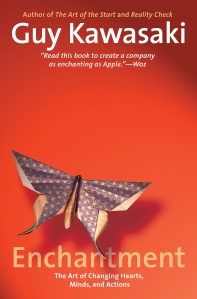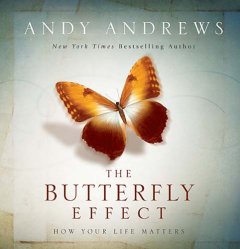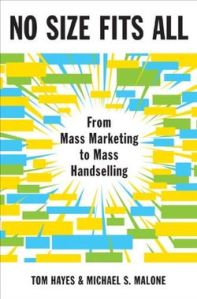 I’ve been a big fan of Guy’s for years, but I must admit this is the first of his books I’ve gotten around to reading. And I’m glad I did.
I’ve been a big fan of Guy’s for years, but I must admit this is the first of his books I’ve gotten around to reading. And I’m glad I did.
His latest, Enchantment: The Art of Changing Hearts, Minds, and Actions(affiliate link) is a breeze of a read and one that I found delightful and, well, enchanting.
While some might be quick to simplify the book’s advice to nothing more than good ol’ common sense, I would argue it is much more than that. Think of a great mentor you’ve had, or one you hope you might one day have. If he or she were to put every ounce of advice into one tome and attempt to do so in a way that is relevant in an always-connected-world, well, this might be the book they’d write.
Along the way, Guy references the dozens of books he read and researched while in the process of writing Enchantment. Many of them I wasn’t familiar with and I plan to dig into several of them soon, as if my list of must-reads wasn’t already long enough.
The single biggest takeaway for me were the two chapters outlining what Guy refers to as “push” and “pull” technologies where push technologies are your presentations, e-mail and Twitter, for example. Examples of pull technologies on the other hand would be your website, blog, Facebook, LinkedIn and YouTube pages, though I think Facebook and LinkedIn could also fall into the “push” category.
In these two chapters, he outlines some best practices for utilizing each. Some of them I’ve seen from Guy before and have actually implemented and used with great success. While, again, some points made are arguably common sense, I suspect many individuals and organizations still aren’t implementing them.
Throughout, the basic and on-going theme of the book, for me at least, was the idea of altruism. I could invoke biblical concepts and verses here, as Guy does: put the needs of others before you own, treat others they way you desire to be treated, not only in the real world, but in the virtual one many of us spend so much of our time in these days. Additionally, Guy’s desire is that this book remain relevant for decades to come, regardless of the inevitable technological changes ahead. I believe he has succeeded in making it so.
Lastly, I thought I’d take advantage of a couple of resources that might help you in determining if this is a book that is right for you. Below, you’ll find a relatively short video as well as an infographic.
This video is an abridged version (about 11 minutes) of Guy’s Enchantment speech.
This infographic does a fine job of summing up the book’s main ideas.
Something I didn’t expect to get out of the book was this little gem (a concept that Guy initially applies to your relationship with your boss):
If your wife asks you to do something, drop everything and do it. You may not think it’s important, but you aren’t juggling four kids, a career, and several charitable causes. You may see the big picture, but you don’t see her big picture.
Worth the price of the book, as Guy argues? I think so.
What are some ways you inject altruism into your daily projects, communication opportunities and the like? Do you think you’ll pick up this book?
___________________________________
Disclosure of Material Connection: I received this book free from the Portfolio / Penguin Group (USA). I was not required to write a positive review. The opinions I have expressed are my own. I am disclosing this in accordance with the Federal Trade Commission’s 16 CFR, Part 255: “Guides Concerning the Use of Endorsements and Testimonials in Advertising.”
Filed under: Books, Reviews | Tagged: Enchantment, Guy Kawasaki | 3 Comments »










 Okay, I’ll just come out and say it. It’s been really hard to Find My Strongest Anything lately. There have been two deaths in my family in the last week, yesterday my one and only laptop hard drive crashed (I’m on a borrowed one now) and, I realized just moments ago that this review is actually due today, October 5th, and not tomorrow, October 6th, as I’d thought. Me, strongest life? Hardly.
Okay, I’ll just come out and say it. It’s been really hard to Find My Strongest Anything lately. There have been two deaths in my family in the last week, yesterday my one and only laptop hard drive crashed (I’m on a borrowed one now) and, I realized just moments ago that this review is actually due today, October 5th, and not tomorrow, October 6th, as I’d thought. Me, strongest life? Hardly. If you watched a movie about a guy who wanted a Volvo and worked for years to get it, you wouldn’t cry at the end when he drove off the lot, testing the windshield wipers. You wouldn’t tell your friends you saw a beautiful movie or go home and put a record on to think about the story you’d seen. The truth is, you wouldn’t remember that movie a week later, except you’d feel robbed and want your money back. Nobody cries at the end of a movie about a guy who wants a Volvo.
If you watched a movie about a guy who wanted a Volvo and worked for years to get it, you wouldn’t cry at the end when he drove off the lot, testing the windshield wipers. You wouldn’t tell your friends you saw a beautiful movie or go home and put a record on to think about the story you’d seen. The truth is, you wouldn’t remember that movie a week later, except you’d feel robbed and want your money back. Nobody cries at the end of a movie about a guy who wants a Volvo.